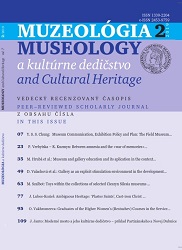Využití konstruktivistických teorií učení v edukačním programu muzea: empirická případová studie
The Use of Constructivist Learning Theories In a Museum Education Programme: Empiric Case Study
Author(s): Veronika KolaříkováSubject(s): Education, Museology & Heritage Studies
Published by: Univerzita Komenského v Bratislave, Filozofická fakulta
Keywords: Museum; education; Constructivist Learning Theories; video study; open coding;
Summary/Abstract: Constructivist learning theories bring benefits to the practice of museum education. They perceive learners as active agents of the learning process, building new knowledge and experience on earlier ones. In addition to knowledge, they also focus on developing a range of skills and competencies, such as the development of critical thinking, communication skills, or social skills. Therefore, they form an appropriate pedagogical background for the educational activities of the museum. The question for museum educators remains, however, how to use them in practice. In the study, possibilities of using them will be presented by introducing the research results to the reader. The realized video study was aimed to find out whether the analyzed educational program of the Silesian Museum in Opava applied elements of constructivist learning theories and, if so, by what means they did so.
Journal: Muzeológia a kultúrne dedičstvo
- Issue Year: 7/2019
- Issue No: 2
- Page Range: 153-168
- Page Count: 16
- Language: Slovak

